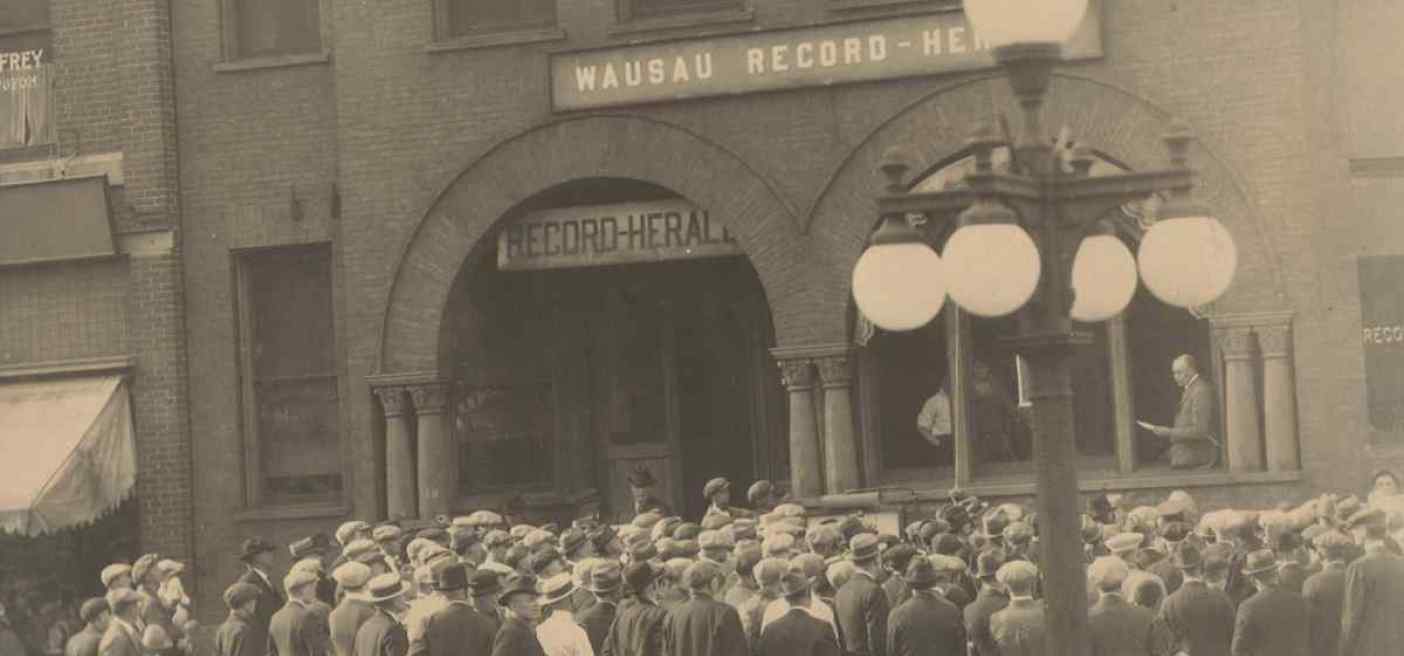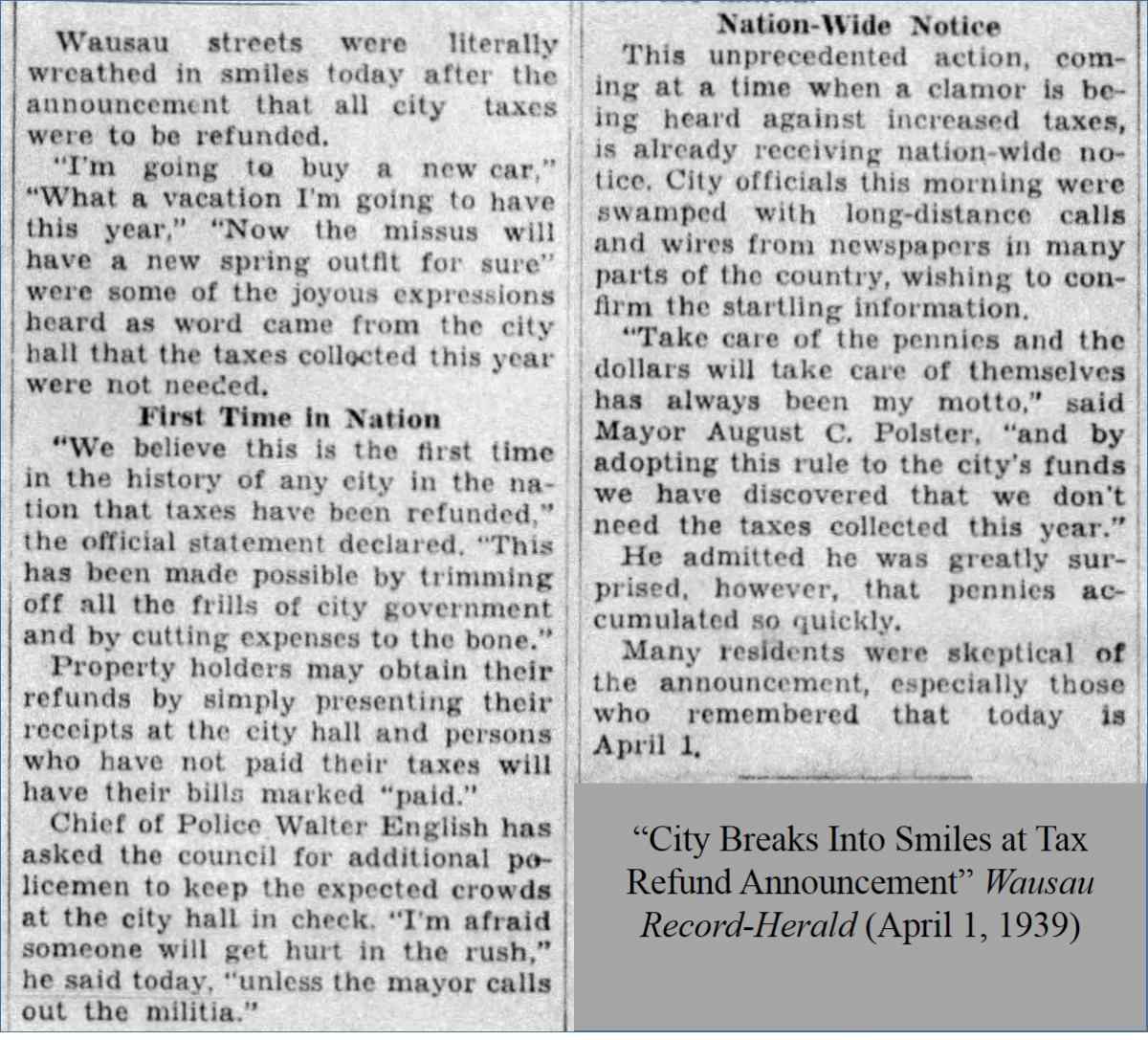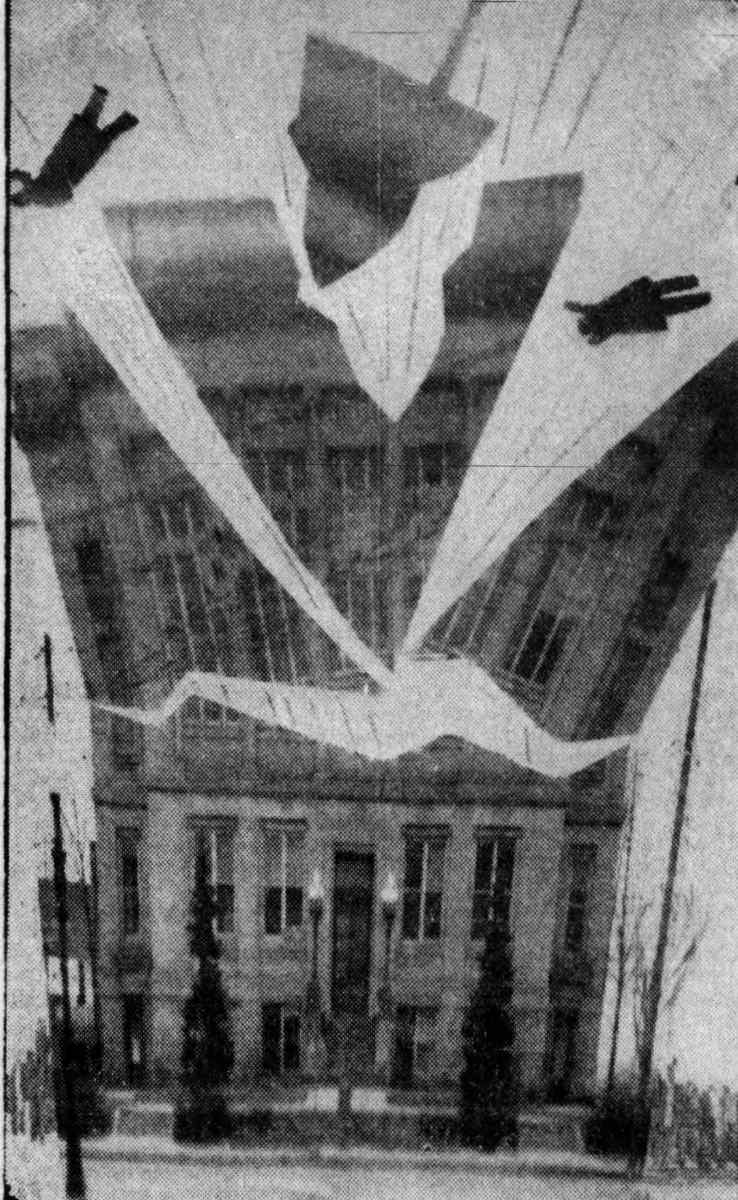An April Fool's Joke Causes a Commotion

The [Wausau Daily] Record-Herald regrets the unfortunate misunderstanding which raised false hopes in the minds of some taxpayers
That was the final line of a brief correction printed in the Wausau Daily Record-Herald on April 3, 1939. The correction was published in reaction to an article that had appeared the previous Saturday. That article had been written with the best intentions, but now the newspaper felt it needed to apologize for how the story had "boomeranged . . . with unpleasant reverberations."
The Story
The article in question was titled "City Breaks Into Smiles at Tax Refund Announcement," and it was intended as an April Fool's day prank. It reported that Wausau's officials (after looking over the city's finances) had decided "that the taxes collected this year were not needed." It also claimed that arrangements were being made so that property owners could bring their tax receipts in to city hall to have them refunded, and that anyone who had not yet to file their taxes would no longer be expected to do so.

To the author and editors at the newspaper, it was clearly a joke. And must have been confident that the taxpayers of Wausau could recognize it as a joke with a little thought.
Would it be nice not to have to pay any city taxes for an entire year? Sure. But to do that the city would have to cut virtually all of the expenses of the city. That would mean having to fire the police department. It would mean closing the city parks and the airport. It would mean no fire protection should a blaze engulf your home. It would eventually mean the breakdown of city utilities, roads, and sewers. And while the city had suffered through nearly a decade of austerity and financial frugality of the Great Depression, surely no one thought the fortunes of Wausau had fallen to that point yet.
And the other conclusion someone might draw after reading the "announcement" by the city officials (if for some reason the readers did not catch the line about cutting services) would be that those officials were incredibly bad at their jobs. It would have meant that they had collected enough taxes the previous year to cover the budget for both 1938 and 1939. And while some people might have low opinions of the abilities of their elected officials, it would be beyond criminally incompetent for them to not notice the numbers, an entire year after those taxes had been collected.
Anyone who read the article and gave it two seconds of thought would recognize the absurdity of the story and recognize it was a joke. And even the most gullible would at least realize it was an April Fool's joke when they read to the final sentence where it was pointed out. It wasn't as if anyone would just skim the article and draw their own conclusions based of the title and a tiny bit of context. . . . Right?
(I'm sure you see where this is headed)
Some Background
Today, it is not all that uncomon for a radio station or newspaper to report something odd or sensational to pull one over their audience on April Fool's Day. But in the early decades of the twentieth century, most newspapers did not print April Fool's day stories.
And since its founding, the editors of the Wausau Daily Record-Herald ensured the newspaper obtained from taking part in any sort of prank or hi-jinks for the holiday. They saw it was unprofessional to abuse the trust of the public in the press, even if it was all for fun. Certainly the Record-Herald would publish stories reporting on how a police officer was tricked by the dispatcher into looking for homes with addresses that did not exist, or delighting in the idea of youths yanking suitcases out from underneath the hands of stopping passersby by using hidden strings. And in particular the editors seemed to delight in reporting the mistakes of other newspapers who resorted to publishing "joke" articles to unfortunate results.
"April fool" jokes that appear in newspapers are apt to result disastrously, as the Madison State Journal discovered when it published a "news" story, as an "April fool" joke, telling of a leading woman prohibition worker of that city coming out last Monday in favor of the Duncan referenda. Of course, the writer of the joke thought everybody would know it was "April fool." He forgot that Wisconsin people are very serious minded people when the wet and dry question is concerned, and so the State Journal had to explain and apologize profusely, later on, in an effort to wipe out the effects of the "joke."
WDRH, April 5, 1929
A decade later, the Record-Herald was forced to print its own apology in an attempt to wipe out it's own "joke." By that point, it had become more common for newspapers to take a more active role in the holiday, and the Record-Herald decided it was time they give it a try.
The Commotion
Almost immediately after the April First edition of the newspaper was released to the public, it became clear that the joke had been lost on many of the readers. Many of them did not read to the very end to have the date pointed out to them, and the meaning of the date probably did not occur to a few who did. And it is hard to be too critical of these readers, considering the rest of the article clearly stated that they would get their taxes back for the last year, and the Record-Herald had never indulged in this sort of fabrication story before 1939. (Well, almost never, but we'll get to that in a little bit).
Within an hour of the newspaper hitting the street, the Record-Herald building was bombarded with phone calls from readers asking if it was true they would be getting their taxes back from the city. Other readers decided to call up the city officials directly -- city officials who (it soon became clear) had been neither consulted nor warned that the fake report was going to be published. The story had made up quotes from Mayor August Polster, Chief of Police Walter English, and City Treasurer Amos Alford, who were now spending their weekend assuring the public that yes, they would need to pay those taxes.
The official correction published in the Record-Herald the following Monday confirmed that it was indeed just an April Fool's joke, apologized for the confusion, and stressed that the city officials did not have any part in the debacle. In its own defense, it pointed out that it was their "first use of that type of "joke"." A small April Fool's Day joke from the previous year (the first attempt at such a prank) had appeared in the form of a fake picture, and since it had not caused "even a mild stir " the newspaper had not realized people could react so strongly.

Some text with the picture suggested that in "a dastardly plot, members of the A.F.D.C. this morning hurled a 'pineapple' into a city hall window and blasted the two story structure sky high." At the end the group was identified as "April Fool's Day Cut-ups."
Needless to say, the citizens of Wausau did end up having to pay their taxes for the year, and everyone learned an important lesson that when joking about a serious matter like taxes, it is best not to be subtle with the reveal or bury it at the end of the story.
